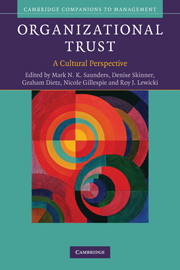Book contents
- Frontmatter
- Contents
- List of figures
- List of tables
- Note on editors
- Note on contributors
- Foreword
- Editors' acknowledgements
- Part I The conceptual challenge of researching trust across different ‘cultural spheres’
- Part II Trust across different ‘cultural spheres’: inter-organizational studies
- 5 Examining the relationship between trust and culture in the consultant–client relationship
- 6 Checking, not trusting: trust, distrust and cultural experience in the auditing profession
- 7 Trust barriers in cross-cultural negotiations: a social psychological analysis
- 8 Trust development in German–Ukrainian business relationships: dealing with cultural differences in an uncertain institutional context
- 9 Culture and trust in contractual relationships: a French–Lebanese cooperation
- 10 Evolving institutions of trust: personalized and institutional bases of trust in Nigerian and Ghanaian food trading
- Part III Trust across different ‘cultural spheres’: intra-organizational studies
- Part IV Conclusions and ways forward
- Index
- References
8 - Trust development in German–Ukrainian business relationships: dealing with cultural differences in an uncertain institutional context
Published online by Cambridge University Press: 05 June 2012
- Frontmatter
- Contents
- List of figures
- List of tables
- Note on editors
- Note on contributors
- Foreword
- Editors' acknowledgements
- Part I The conceptual challenge of researching trust across different ‘cultural spheres’
- Part II Trust across different ‘cultural spheres’: inter-organizational studies
- 5 Examining the relationship between trust and culture in the consultant–client relationship
- 6 Checking, not trusting: trust, distrust and cultural experience in the auditing profession
- 7 Trust barriers in cross-cultural negotiations: a social psychological analysis
- 8 Trust development in German–Ukrainian business relationships: dealing with cultural differences in an uncertain institutional context
- 9 Culture and trust in contractual relationships: a French–Lebanese cooperation
- 10 Evolving institutions of trust: personalized and institutional bases of trust in Nigerian and Ghanaian food trading
- Part III Trust across different ‘cultural spheres’: intra-organizational studies
- Part IV Conclusions and ways forward
- Index
- References
Summary
Summary
This chapter examines cultural differences and institutional uncertainty as important factors in the development of trust as a basis for successful international business relationships. The authors focus their investigation on the potential that actors have in becoming aware, and creatively responding to, institutional contexts, cultural differences and the challenge of trust development. Empirically, the authors look at German–Ukrainian business relationships and draw on a qualitative analysis of twenty-one field interviews and personal observations from the time of the so-called ‘Orange Revolution’. They conclude that generally the trust dilemma in international business relationships can be overcome through reflexivity and creativity, and they give many practical examples of what this means.
Introduction
The typical dilemma faced in international business relationships is that trust is particularly important and, at the same time, particularly difficult to achieve when the partners come from different cultures (Kühlmann, 2005; Zaheer and Zaheer, 2006). The positive expectations and willingness to be vulnerable associated with trust (Rousseau et al., 1998) are required even more, but are harder to produce, in business relationships where different cultural backgrounds increase the unfamiliarity and uncertainty between the partners. Successful cross-cultural business relationships may be jeopardized because the process of familiarization that they need to go through to build trust already requires some basic familiarity and trust to ‘shift the boundaries of familiarity from within’ (Möllering, 2006: 96, emphasis in original; see also Luhmann, 1988), which is more easily said than done.
Information
- Type
- Chapter
- Information
- Organizational TrustA Cultural Perspective, pp. 205 - 226Publisher: Cambridge University PressPrint publication year: 2010
References
Accessibility standard: Unknown
Why this information is here
This section outlines the accessibility features of this content - including support for screen readers, full keyboard navigation and high-contrast display options. This may not be relevant for you.Accessibility Information
- 5
- Cited by
